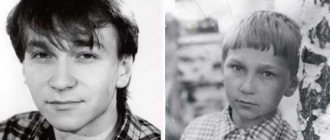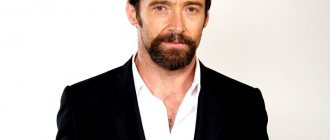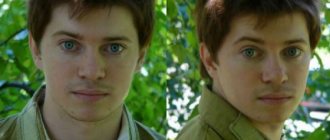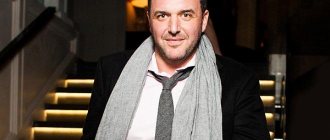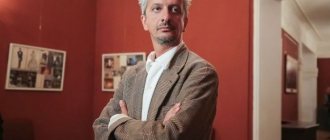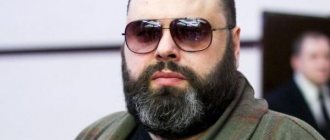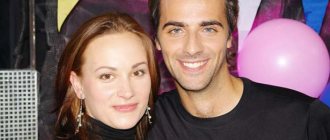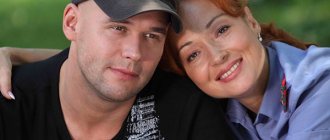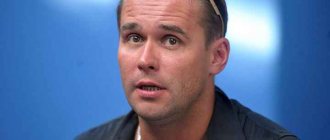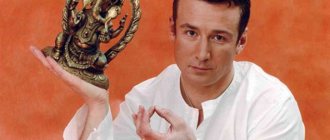Childhood and youth
Even in early childhood, Maxim’s parents separated. Soon the poet Alexander Aronov, who worked at Moskovsky Komsomolets, became Maxim’s stepfather. He was a man of encyclopedic knowledge, with a great sense of humor. At that time, Maxim was 16 years old. The boy met with his blood father once a year. The boy was raised by his mother and grandmother Vera Bureva.
Maxim’s grandfather, who died during the war, was an actor, just like his grandmother. It was from him that the boy inherited his acting talent. In his childhood, Maxim did not even think about a career as an actor. Thanks to his grandmother, the boy mastered playing the piano. Later he graduated from music school. Maxim sang in a school vocal group and only in English. In high school, I began to dream of becoming a doctor, but I couldn’t make up my mind for sure.
During his studies, Maxim studied in three secondary schools in the capital. The last one was school No. 232, which had a literary bias. He often skipped classes, loved to sleep, so he came only to the third period. The boy had a tense relationship with his teachers. They often kicked Maxim out of lessons. I wasn’t friends with my classmates and didn’t communicate with almost anyone.
In high school, Maxim Sukhanov strived for success using other methods: he raised aquarium fish and cooked jeans. I realized very early that there must be money if you don’t want to live in a ditch and don’t want to see your loved ones there.
After graduating from secondary school, the young man tried to enter the Ippolitov-Ivanov Music School. But the attempt was unsuccessful. To avoid military service, Maxim easily entered the Shchukin Theater School.
The young man studied at the university from 1981 to 1985 at the acting department in the workshop of Honored Artists of the RSFSR Tatyana Kirillovna Kopteva (1921-1994) and Vladimir Vladimirovich Ivanov (born 1947). During his studies, Maxim fell in love with the acting profession so much that he soon forgot about medicine and music. After the young man became interested in the profession of an actor, his attitude changed greatly.
Vladimir Mirzoev and Maxim Sukhanov are preparing a play about family tyranny
The performance really doesn’t lack for gloominess. The decorations alone are worth it: a semicircular wall, painted half white, half bloody crimson, shabby doors. According to Sukhanov, such architecture indicates tyranny: “In our case, it is already aging, peeling, but columns, pilasters, a portico, cornices and other signs of the empire remain.” And among the props are these huge pieces of meat and terrible, gnawed bones, very naturalistically made of plastic. Father named Max, the head of the family, sold meat all his life.
“Meat is the professional specialty of this family,” continues Mirzoev. “Max is a butcher by profession and often recalls this with pride. But the play, of course, is about the “butcher” in quotation marks. When we call Stalin a butcher, that is, an executioner, this is the correct connotation. The whole play is, in essence, an extended metaphor, and the hero's profession is quite ambiguous. There are nuances that indicate that the hero is a cold-blooded killer and maniac. “Homecoming is an intelligent detective story too.”
Teddy looks all the more contrasting in this depressive house - Max's son, who has been living in London for a long time, received a doctorate and now, together with his young wife, has come to visit his brothers, his feeble-minded uncle and his despot father. This couple - Teddy (Maxim Vitorgan) and Ruth (Victoria Chilap) - seems to be from another, bright world. By the way, choosing an actress for the role of Ruth turned out to be extremely difficult for the director.
“Ruth, or Ruth, is the most intriguing figure in the play. It takes a very unusual personality to play this role. We don’t have many young actresses who are close to the role of a “strange heroine”, with a certain shift. Such actresses are not often born in Russia, or such women rarely enter the acting profession. Ruth could have been played by Olga Yakovleva or Anastasia Vertinskaya - at thirty years old, of course. In our case, this role is played by the actress of the Theater of Nations Victoria Chilap. By her acting and human nature, Vika was created for this role,” says Mirzoev.
But the energetic center of the performance is, of course, the image of Sukhanov. His name is the same as the character. He comes on stage, ready to play: a real old despot. And even when talking behind the scenes, the actor still speaks in the same humming voice, extremely slowly returning to his usual manner.
“When I get ready to work, I already acquire the configurations of this character. I don’t really think about how it comes. They ask: is this a big job? I never have a small one. Any stage related to work is a big one. It’s about immersion, development, and finding the character’s language,” explains the actor.
Professional activity
Since 1985, Maxim Sukhanov became an actor at the Vakhtangov Theater, on whose stage he plays to this day . Maxim's talent was discovered by theater director Vladimir Mirzoev. The performances that made the artist famous on the stage were: “Zoyka’s Apartment”, “Don Juan”, “Richard III”, “Barbarians”, “A Glass of Water”, “Amphitryon”, “Cyrano de Bergerac”.
For him, working in the theater is, first of all, a pleasure associated with the realization of his self. The artist also collaborated with other theaters, including Lenkom, the Stanislavsky Theater and the Mayakovsky Theater.
The young actor made his film debut in 1985 in the melodrama “Quiet Outpost” directed by Vasily Pascaru, where he played the role of Levko. The actor’s filmography includes more than 60 film works. Maxim always participates only in those films that he likes. Among the notable projects in his film career are:
- “It is not recommended to offend women”;
- "24 hours";
- "Children of Arbat";
- "Countdown";
- “Moscow, I love you!”;
- "Natasha";
- "Country of the Deaf";
- "Boris Godunov";
- "Viking".
The artist has many different theater prizes and awards. Maxim has experience in dubbing both Russian and foreign films. Maxim Sukhanov never dreams of roles. Just waiting for proposals from directors. And then he either agrees or refuses, and goes his own way. The actor considers cinema and theater to be two different territories. He considers working in the theater useful for psychophysics, for keeping it in shape.
The artist has little producing experience. The actor was attracted to this activity by his friend, Alexander Samoilenko. Maxim also recorded a number of audio books. The actor really enjoys working in this genre. At the beginning of October 2020, the social drama “The Wizard”, directed by Mikhail Morskov, was released with the participation of the artist in the title role.
At the end of 2019-2020, the premiere of four more film projects will take place, in which you can watch the performance of a talented and charismatic actor. These are the paintings “Masha”, “One Breath”, “Through a Black Glass” and “Hypnosis”. In the last two projects, Maxim got the main roles.
Dialogue of silence. The roles and travels of actor Maxim Sukhanov
Actor Maxim Sukhanov, twice laureate of the State Prize of the Russian Federation, loves to visit Europe, but lives and works in Moscow, where he continues to perform on the stage of the Vakhtangov Theater and act in films. A popular actor who has played Joseph Stalin and Boris Godunov, Peter the Great and Don Juan, Cyrano de Bergerac and King Lear, Sukhanov usually eschews political statements, but quite clearly outlines his social position.
In 2014, for example, he supported the peace march against the war with Ukraine, then took part in a project in support of Ukrainian director Oleg Sentsov, who is serving a sentence in Russia, and at one time stood up for Yukos lawyer Svetlana Bakhmina and members of the group Pussy Riot. Most recently, Maxim Sukhanov took part in video performances by Russian cultural figures in defense of Ivan Golunov. In a conversation with Radio Liberty's Berlin correspondent, Maxim Sukhanov talks about his profession, theater and film directors, in particular Peter Stein and Vladimir Mirzoev, how to play Shakespeare, his German roots and freedom of choice.
Embed share
Dialogue of silence. Interview with Maxim Sukhanov
by Radio Liberty
Embed share Text copied
The URL has been copied to your clipboard
- Share on Facebook
- Share on Twitter
No media source currently available
0:00 0:26:14 0:00
Download media file
- 64 kbps | MP3
– When did you first go abroad?
Maxim Sukhanov at the gathering of the Theater troupe. Evgenia Vakhtangova
– It was 1988, and it was London. I came as part of the troupe of the Vakhtangov Theater with the play “Brest Peace” based on the play by Mikhail Shatrov. Since in this performance a large role was assigned to Leon Trotsky, actress Vanessa Redgrave, whose brother was a Trotskyist, invited our performance, which was staged by the famous European director Robert Sturua, on tour, and she and her brother were delighted with the performance. This was during the time of perestroika, during the time of revelations, and in general, to some extent, this performance exposed this entire Bolshevik “company”.
For me, apart from the figure of the director, any dramaturgy, no matter how brilliant it may be, can be a dead interlocutor
The performance was very modern for those times, there were no excessive decorations - the Kremlin, overcoats, Budenovkas, well, in a word, the performance was modern. Plus, it seems to me that Gia Kancheli wrote the music very well for the performance, and all together this created a resonance, it’s not for nothing that we later traveled to many countries with this performance. And I had a microscopic role, not even tiny, but microscopic, and it was at the very beginning. That is, I could act out my part and not stay to bow, but go for a walk around the city... Of course, some colleagues quite naturally envied me.
I was immediately fascinated by London. Moreover, I probably can hardly say this about any other country: I found myself in a space that seemed very familiar... I don’t know why, but it was very familiar, and at the same time very comfortable and cozy. We lived in the center and walked in the center; I did not travel through residential areas. We were in London for 10 days, and in general, I was delighted all these 10 days.
– Was the hall full?
- Yes, the hall was filling up. It was The Lyric Theatre, February, I remember, the cherry blossoms were already blooming. However, we were very surprised then that some spectators were sitting in the hall wearing coats. We don’t have that, but apparently it was cool there or something... Well, apparently, their theater lives in a democratic tradition. Probably, if this was an opera, they would dress differently... Well, I don’t know, but it was a novelty for us.
– I heard from you about some kind of German roots of yours.
– My great-great-great-grandfather Philip Karl Garde came to Russia from Germany, I don’t know exactly when, but according to documents it seems in the first third of the 19th century (and maybe earlier), and they lived in the Yaroslavl province, were engaged in agriculture there, and he also there was some kind of “piece of shipping company”. My great-great-great-grandfather had 12 children, mostly girls, and I saw one of his daughters, that is, my great-grandmother, because in 1968 we went there, or rather, my mother and grandmother took me to Yaroslavl to visit them. My great-grandmother's name was Ekaterina Filippovna. And her son, therefore, my grandfather Konstantin Petrovich Buzanov, was an actor in the Meyerhold Theater. After the theater was closed, and Meyerhold was arrested and shot, my grandfather “poked” at some theaters and for some time was at the Theater of the Revolution, and then at the Film Actor Theater, managed to star in a small role in the legendary film by Mikhail Romm “Dream” " In the same 1941, with the beginning of the war, he went to the front and died in September near the city of Kalinin.
Maxim Sukhanov - about Ivan Golunov
– You played in several Shakespearean productions – King Lear, Twelfth Night, The Taming of the Shrew. What is Shakespeare to you? They say that an actor with experience of acting in Shakespeare's plays is one actor, and without it - another...
A talented director, inviting an actor to play a role, usually knows or feels what this actor is currently living
– I wouldn’t put the question that way. The most important thing is not what, but with whom. For me, apart from the figure of the director, any dramaturgy, no matter how brilliant it may be, can be a dead interlocutor. If the director is not talented, then it doesn’t matter whether he is directing Shakespeare or some kind of horror... Working with a director who cannot open anything for you, you begin to feel your professional incompetence. I once had an assignment for the role of Richard III with a director from Georgia. I started rehearsing, and, unfortunately, after 15 rehearsals it became clear to me that we would not find a common path, that we meant more and more different things when we rehearsed... And I had to give up this role.
Trailer for the mini-series “Studies of Freedom.” Director Vladimir Mirzoev
Preparation for a performance should be, first of all, the preparation of the director. As for Shakespeare, the director’s internal foundations are especially important here in order to stage his plays, mysterious in their poetry and psychology. And by joining what the director offers, you also begin to be ready. A director who is talented, no matter what excellent relationship you have with him, will never offer you a role if he sees that you are not ready for this topic... Or you are not ready for this playwright... A talented director, inviting an actor to play a role, like usually knows or feels what this actor is living now. The director knows that it’s too early for this actor to do something, and some things may already be too late, some things are out of time for him, but some things hit the sweet spot. A director's ability to sense this is very important.
– Are there other roles that you could have played and did not play - and do you regret it?
You think that you would walk the same road, but the person has already walked it, and everything worked out for him...
– I had an episode when I was invited to an interview with Peter Stein. I was supposed to rehearse Claudius in Hamlet with him. But I didn’t even start, because the conditions that were offered to me surprised me, to be honest. Rehearsals had to last at least eight hours. In general, this is a rather strange thing for me - to rehearse for eight hours. Secondly, throughout the entire rehearsal period I was not supposed to perform plays in the theater. This was the condition, such massive preparation had to take place over a month or a month and a half. Apparently, Stein had no more time, so he decided to compress the rehearsal process as much as possible and make it denser...
– Are there any works by colleagues that have delighted you?
- Well, of course! When I watched Leonid Mozgovoy play Lenin in Alexander Sokurov’s film “Taurus” (and then I watched this film twice more), I realized then (and now I can say the same thing about it) that Mozgovoy played in such a way that there is no need to add anything to this - everything is very accurate, right to the top. One can only rejoice that something has happened that, in general, one no longer needs to think about. I would probably go exactly the same way. But you think that you would have walked the same road, but the person has already walked it, and everything worked out for him... But it’s nice that you coincide...
– You have already spoken about directors without names. But what did your meeting with Vladimir Mirzoev bring you? You played many main roles with him: in the plays “Khlestakov”, “King Lear”, “The Marriage of Figaro”, “That Light”, “Amphitryon”, “Don Juan”, “Tartuffe”, “Cyrano de Bergerac”, etc. the film “Boris Godunov”, in the telenovela “Mentors”, in the mini-series “Studies on Freedom”.
– Before meeting Mirzoev, I studied at school and worked in the theater. I saw many different performances – both by Robert Sturua and Pyotr Fomenko. I worked with Fomenko, and at one time I worked quite closely with Harry Chernyakhovsky. Naturally, I developed a sense of my theatrical capabilities. And so, when I watched the premiere of Mirzoyev’s “Marriage” with Elizaveta Nikishchikhina, Alexander Feklistov and Volodya Simonov, something happened to me... It was as if I was turned upside down... At such a moment you think: “Oh, this is it!” Understand? And at the same time, you feel that you also have all this, and it resonates in you... But I haven’t seen this before, and I didn’t imagine this language that Volodya Mirzoev spoke in “Marriage.” And here is the feeling that it, this language, lives in me.
Maxim Sukhanov reads Friedrich Gorenstein’s story “Three Meetings with Lermontov”
What did this give me, you asked? Another dimension of life. Then there was a connection with the director in different performances. The interest in how Mirzoev thinks and where these thoughts lead him has not faded away in me at all. Although we, unfortunately, have not done anything on stage together for five years after “Figaro” (Sukhanov plays Count Almaviva in this play, and Mirzoev, due to his political views, is practically deprived of the opportunity to work in Russia as a theater director. - RS) . Volodya rehearses in a special way; I believe he has his own “bird language” in which he speaks. He has the same language when he is silent and rehearses, and you wonder whether everything is going in the right direction or not... That is, Mirzoev is one of the few figures (and maybe the only one) of the theater from whom only verbal routes should be required. Actors very often, especially when rehearsing with different directors, want to be given a task, they sometimes want to speak out. Not always, of course, but often a lot happens in conversations, which is also correct. But with Volodya, you need to feel what he wants (probably this happens with other directors) and in which direction he would like to move something. This is also a dialogue, but a dialogue of silence.
– Does Mirzoev see the world differently than others, does he see people differently? Was his view of the world new to you then?
Maxim Sukhanov as Tartuffe and Maria Mironova as Elmira during the rehearsal of the play “Tartuffe” directed by Vladimir Mirzoev at the Lenkom Theater
– At that time for me – yes, of course! On the one hand, this view is new, and on the other hand, it intersected with my view, with the way I felt the combination of form and content in creating dramatic intonations and meanings. In general, it was interesting what meanings are collected from - the vector of this expanded thanks to Mirzoev. Of course, there cannot be many such meetings as ours, probably there cannot even be two of them... It is all the more difficult to rehearse with others, because the scale of Mirzoev’s analysis of the material is enormous. I don't know how other actors read it, what they get from him. But for me, what Volodya reveals and digs up - God forbid that all this is somehow collected and broadcast...
– I sometimes think about some strangeness of how a man lives the life of an actor without doing anything else - he acts all his life and lives, lives to old age, and leaves. The acting profession, according to some, is generally somewhat feminine. But for you, actor Sukhanov, acting seems to be not enough. There is acting, and you are a master at it, but it doesn’t fill your whole life, and you always have something, have interests besides this, right?
Everything related to borders, divisions, prohibitions - these are all games of a bunch of people
“Nothing has ever filled me completely and completely.” In general, I think that this is a trait of my character associated with adventurism. I don’t see the point in doing something without pleasure - I should get this pleasure from something all the time. And, apparently, from different things. I can imagine a person sitting at a table and spending ten years proving some theorem. He probably also gets some kind of cosmic pleasure from this, but I don’t have such an ability. Therefore, some other fillings are also important to me. That’s why I can’t rehearse more than two hours a day, although I can rehearse the same role for six months. Two hours - and then there is a slippage.
– Your colleague, actor Alexey Serebryakov, took his family to Canada at one time, explaining: he would like his children to grow up in a different life from the life that exists today in their homeland. How do you feel about this position?
– Despite the fact that I grew up and lived quite a long period of my life in the Soviet Union, I have always been interested in how people live where European culture and, in particular, music were created and continue to be created. I always dreamed that there were no boundaries. And in the end I came to the conclusion that everything related to borders, divisions, prohibitions - these are all games of a bunch of people. One way or another, there, in this “bunch”, everything exists in order to either continue to be in power, or simply have the pleasure of prohibiting someone from doing something. I think there is a population of people who are trying to take a position from which they can start banning things. Not to do better for others, but to prohibit.
Every person should have free choice
I treat any civilized forms of life with joy, as well as people’s choice towards greater security, especially for their children. And I can only be glad that there are people who make just such a choice. It’s a shame that there are still only a few such people. What determines the decision of some to give their will into the hands of others and their brain at the disposal of other people’s convolutions? This is a separate topic. After all, choosing a place where you feel comfortable, where you think your children are comfortable—every person should have such a free choice. No one should reproach anyone for this. We are very fond of: when someone does something differently from the majority, they see something suspicious in it. It’s not that it’s strange, or “oh, interesting!”, or “oh, interesting!”. No, something is suspicious. We have such a feature - “atu!” shout to those who do not act as the majority do,” said actor Maxim Sukhanov .
Sukhanov has just finished filming in Valery Todorovsky’s film “Hypnosis” and is starting filming in director Anastasia Palchikova’s debut film “Masha”.
Personal life
Maxim Sukhanov is married for the second time. The artist’s first wife was actress Daria Dmitrievna Mikhailova (born in 1965). Their marriage produced a daughter, Vasilisa (born in 1988). Vasilisa followed in the footsteps of her parents and also became an actress, graduating from the Shchukin School. She is married and has a son, Sava (born in 2017).
Maxim with his wife and daughter Vasilisa
Due to Maxim's passion for actress Lada Maris (born in 1968), his marriage to Daria broke up. The artist met the girl during their collaboration in the play “Salome - Princess of the Jews,” where they played the main characters. The real name of the actress of Ukrainian origin is Zavalko. The artist lived with Lada for several years in a civil marriage.
During this period, the young people had a daughter, who was named Sophia (born in 1993). Their relationship lasted five years. Today, Sophia is a photographer and designer by training, although she also has acting skills.
Maxim’s second wife was journalist and writer Eteri Chalandzia. They met during an interview that the girl came to interview a famous actor. From that moment they have not separated.
Eteri is not only a beloved wife for the actor, but also a partner in creative activity. Together the couple wrote the script for the film project “Twenty Cigarettes”. The couple are raising a joint son, Buba.
Recognition and awards
- Laureate of the State Prize (1996, for the play “Khlestakov”);
- Nika Award in the category “Supporting Role” (1998, for the film “Country of the Deaf”);
- Golden Aries Award in the category “Best Actor” (2000, for the film “It is not recommended to offend women”);
- Laureate of the State Prize (2001, for the play “Cyrano de Bergerac”);
- Golden Mask Award (for the role of Cyrano in the play Cyrano de Bergerac);
- Seagull Award (for best acting duet, with Alexander Sirin, 2007)
- Nika Award in the category “Supporting Actor” (2009, for the film “The Man Who Knew Everything”);
- 2012 - XVIII Russian Film Festival "Literature and Cinema" in Gatchina - prize for best actor (film "Boris Godunov")[11];
- 2013 - nomination for the Golden Eagle Award for Best Actor in a Film ( Metropolitan Alexy
, film "Horde") - 2013 - Nika Award for Best Actor ( Metropolitan Alexy
, film “Horde”) - 2013 - 17th International Film Festival "Dark Nights", Tallinn - prize for best actor (film "Role")[12]
- 2014 - nomination for the Nika Award for Best Actor (film "Role")
- 2014 - IV Transbaikal International Film Festival (Chita) - prize for best actor (film “Role”)[13]
Interesting Facts
- Maxim Sukhanov's height is 191 cm.
- Grandma Vera Ivanovna had a great influence on Maxim as a child. The woman was a student of the legendary Vsevolod Meyerhold, like her grandfather.
- The actor lives with his wife outside the city. Maxim loves silence and nature. In addition to acting, the artist is engaged in business - he owns the Mayak restaurant in Moscow.
- The actor does not consider himself a star. Maxim is not active in his search for new projectors. He is lazy from time to time, but tries to fight it. The actor has never had a situation where he couldn’t imagine himself without acting.
- Likes to read books and re-read plays, especially Shakespeare. He also likes the works of Gogol and Chekhov. I like absurdist prose. He is also looking for himself in other areas.
- The actor does not like to dedicate journalists to the details of his personal life. He considers it wrong to talk about family life. The actor tries not to think about the bad. He believes that bad things cannot be discussed or talked about; it is necessary to avoid them and not notice them.
- When making a decision, she always listens only to herself and her intuition.
Filmography
Acting works
- 1986 - Quiet Outpost
- 1986 - Lonely bus in the rain - Tsyrin
- 1987 - I have the honor
- 1987 - My first teacher... - man in a restaurant
- 1994 - Limita - Sergey Sergeevich Makarov
- 1998 - Country of the Deaf - “Pig”
- 1998 - Natasha - Sergei
- 1999 - Mom - head of a special hospital
- 1999 - It is not recommended to offend women - Sasha
- 2000 - 24 hours - Felix
- 2003 - Theatrical novel - Ivan Vasilyevich / Bombardov
- 2004 - Pan or Disappeared - Stanislav Vershillo
- 2004 - Goddess: how I fell in love - Mikhail Konstantinovich, professor
- 2004 - Children of Arbat - Stalin
- 2005 — Random glance (short film)
- 2006 - Signs of Love - Yasha Elephant / Casanova
- 2006 - Countdown - Senior
- 2007 - 20 cigarettes - Manuil Petrovich
- 2008 - Inhabited Island - Dad
- 2009 - The Man Who Knew Everything - Nikolai Shimkevich
- 2010 - Moscow, I love you! (short story “A Summer Night Smile”) - angel
- 2010 - Burnt by the Sun 2: Imminence - Stalin
- 2011 - Burnt by the Sun 2: Citadel - Stalin
- 2011 - Boris Godunov - Boris Godunov
- 2011 - Target - Viktor Chelishchev, Minister of Subsoil and Natural Resources of Russia
- 2011 - Horde - Metropolitan Alexy
- 2012 - Winter of the Dead: Blizzard - Zombie
- 2013 - Role - Nikolai Evlakhov
- 2014 - Kuprin - Sergey Grigorievich Kashperov, wealthy breeder
- 2016 - Viking - Sveneld
- 2017 - Myths - Coca, criminal
- 2017 - Three sisters - Colonel Vershinin
- 2017 - Mot Ne - Unhu, Dina's husband
- 2018 — Sketches about freedom — Mikhail
- 2018 - Through Black Glass - Ostrovoy
- 2019 - Wizard - Fima
- 2020 - One breath - Vadim Batyarov
- 2020 - Hypnosis - Dr. Volkov
- 2020 - Masha - Godfather
Producer
- 2003 - Days of an Angel
- 2004 — Parcel from Mars
- 2007 - 20 cigarettes
- 2008 - Summer resident
Voice acting
- 2003 - Oldboy - Oh Dae Soo
- 2006 - Quiet Don - Grigory Melekhov
(role of Rupert Everett) - 2007 - The Master and Margarita (audiobook, "Union") - Yeshua, Master, Pilate, Woland
Documentaries
- 2012 - filming in the film “Swamp Fever”[2].
Theater works[ | ]
Moscow Drama Theater named after. K. S. Stanislavsky[ | ]
- "Khlestakov" - Khlestakov
- "That light"
- "The Taming of the Shrew"
- “Betrayal” - Robert
(on the stage of the K. S. Stanislavsky Moscow Drama Theater until 2011, then at the E. Vakhtangov Theater)
Theater named after E. B. Vakhtangov[ | ]
- 1988 - “Glass of Water” by E. Scribe - Meshem
- 1989 - “Zoyka’s Apartment” by M. Bulgakov - Amethysts
- 1989 - “Brest Peace” by M. Shatrov - Orator
- 1990 - “Sovereign, you are our father” by F. Gorenstein - Peter I
- 1998 — “Amphitryon” by Moliere — Mercury
- 2001 - “Cyrano de Bergerac” by E. Rostand - Cyrano de Bergerac
- 2003 - Shakespeare's Lear - Lear
- 2005 - “Don Juan and Sganarelle” - Don Juan
- 2011 - “The wind rustles in the poplars” - Fernand
- 2011 - “Betrayal” - Robert
Entreprise [ | ]
- 2014 - “Coming Home”, G. Pinter
- 1990 - “The King is Dying” E. Ionesco - doctor
- "Pinter Collection"
- 1991 — “Salome, Princess of the Jews”
Filmography[edit | edit code]
Acting works[edit | edit code]
- 1986 - Quiet Outpost
- 1986 - Lonely bus in the rain - Tsyrin
- 1987 - I have the honor
- 1987 - My first teacher... - man in a restaurant
- 1994 - Limita - Sergey Sergeevich Makarov
- 1998 - Country of the Deaf - “Pig”
- 1998 - Natasha - Sergei
- 1999 - Mom - head of a special hospital
- 1999 - It is not recommended to offend women - Sasha
- 2000 - 24 hours - Felix
- 2003 - Theatrical novel - Ivan Vasilyevich / Bombardov
- 2004 - Pan or Disappeared - Stanislav Vershillo
- 2004 - Goddess: how I fell in love - Mikhail Konstantinovich, professor
- 2004 - Children of Arbat - Stalin
- 2005 — Random glance (short film)
- 2006 - Signs of Love - Yasha Elephant / Casanova
- 2006 - Countdown - Senior
- 2007 - 20 cigarettes - Manuil Petrovich
- 2008 - Inhabited Island - Dad
- 2009 - The Man Who Knew Everything - Nikolai Shimkevich
- 2010 - Moscow, I love you! (short story “A Summer Night Smile”) - angel
- 2010 - Burnt by the Sun 2: Imminence - Stalin
- 2011 - Burnt by the Sun 2: Citadel - Stalin
- 2011 - Boris Godunov - Boris Godunov
- 2011 - Target - Viktor Chelishchev, Minister of Subsoil and Natural Resources of Russia
- 2011 - Horde - Metropolitan Alexy
- 2012 - Winter of the Dead: Blizzard - Zombie
- 2013 - Role - Nikolai Evlakhov
- 2014 - Kuprin - Sergey Grigorievich Kashperov, wealthy breeder
- 2016 - Viking - Sveneld
- 2017 - Myths - Coca, criminal
- 2017 - Three sisters - Colonel Vershinin
- 2017 - Mot Ne - Unhu, Dina's husband
- 2018 — Sketches about freedom — Mikhail
- 2018 - Through Black Glass - Ostrovoy
- 2019 - Wizard - Fima
- 2020 - One breath - Vadim Batyarov
- 2020 - Hypnosis - Dr. Volkov
- 2020 - Masha - Godfather
Producer[edit | edit code]
- 2003 - Days of an Angel
- 2004 — Parcel from Mars
- 2007 - 20 cigarettes
- 2008 - Summer resident
Voice acting[edit | edit code]
- 2003 - Oldboy - Oh Dae Soo
- 2006 - Quiet Don - Grigory Melekhov
(role of Rupert Everett) - 2007 - The Master and Margarita (audiobook, "Union") - Yeshua, Master, Pilate, Woland
Documentaries[edit | edit code]
- 2012 - filming in the film “Swamp Fever”[2].
